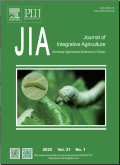首页|期刊导航|Journal of Integrative Agriculture|Nutrition impacts of non-solid cooking fuel adoption on under-five children in developing countries
Journal of Integrative Agriculture2024,Vol.23Issue(2):P.397-413,17.DOI:10.1016/j.jia.2023.11.032
Nutrition impacts of non-solid cooking fuel adoption on under-five children in developing countries
摘要
关键词
non-solid cooking fuel/nutrition benefits/under-five children/developing countries分类
医药卫生引用本文复制引用
Yalin Tang,Yuhe Guo,Gang Xie,Chengfang Liu..Nutrition impacts of non-solid cooking fuel adoption on under-five children in developing countries[J].Journal of Integrative Agriculture,2024,23(2):P.397-413,17.基金项目
This work was supported by the National Natural Science Foundation of China(71861147003 and 71925009). (71861147003 and 71925009)

